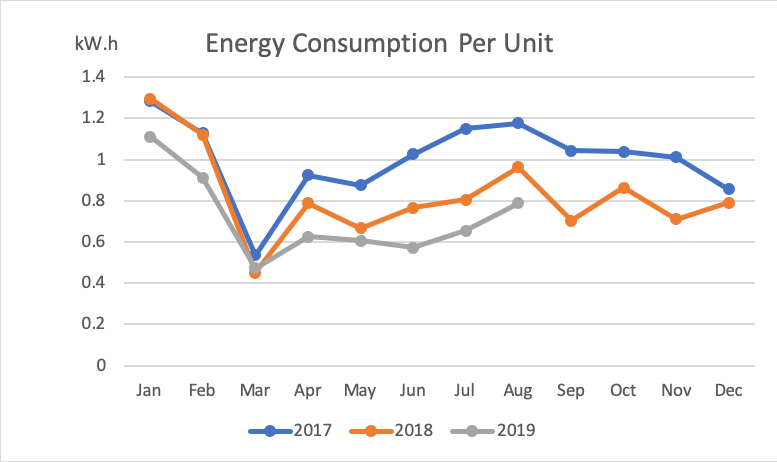M&S has been committed to promoting energy saving and emission reduction projects in the supply chain in China, encouraging factories to continuously reduce resource waste in the production process, eliminate waste on the environment, save resources, reduce waste generation and benefit the society.
In November 2018, M&S successfully promoted a down products factory in Hangzhou to carry out scientific management on high-energy equipment such as washing machine, wool sorting machine and central air conditioner, eliminate the phenomenon of reactive power operation, and achieved a consistent monitoring system on equipment maintenance and inspection. In 2018, the water consumption of the plant was 20% lower than that of 279,947 tons in 2017, the electricity consumption was 10% lower than that of 2771,265 kilowatt-hours in 2017, and the natural gas consumption was 8% lower than that of 318.16 tons in 2017. And successfully achieve to be “M&S Eco Factory".
In August 2019, after more than two years of training for factory management and workshop heads, M&S promote another shoe factory in Nanhai district of Foshan city to achieve saving water and energy consumption per unit as below (Time Range : Jan 2017 – Aug 2019):
- Water consumption saving 0.006 ton(2017 / 0.031 ton, 2018 / 0.029 ton, 2019 / 0.025ton)
- Energy consumption saving 0.255 degree(2017年/ 1.000 degree, 2018 年/ 0.828 degree, 2019 年/ 0.645 degree)
The factory plans to save electricity consumption by 5 percent, water consumption and waste production by 10 percent, and kitchen waste by 20 percent over the next three years, after successfully passing the “Eco factory” certification ( Base year 2017).
Foshan Nanhai shoe factory – Achievements of water consumption after improvement


Evaluation standard of M&S "Eco factory”
· The workshop uses negative pressure fan and water curtain air conditioner to ensure indoor comfort, office area and dormitory use split air conditioner to maintain indoor temperature.
· Use natural light, especially in finished goods warehouses.
· Water - The production water is used in the cooling water circulation of the refrigerator and the water curtain air conditioning system. Faucet flow control.
· Waste - The factory sorts the waste, such as paper, packaging, plastic bags... sort them to see if they can be reused.
In the future, M&S will continue to promote more factories of different sizes, types and backgrounds to join the "Eco factory" to jointly build a green supply chain.
(The above content is provided by the brand, and the authenticity of the data is the responsibility of the brand)